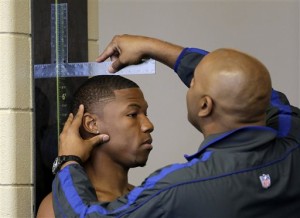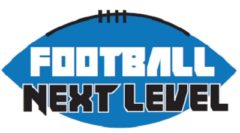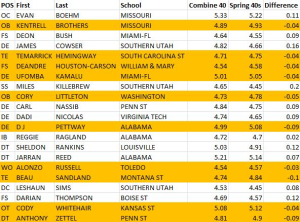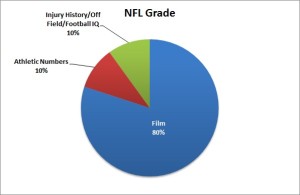
Right now we are getting close to the 2016 NFL draft but NFL scouts around the country are already hard at work on the 2017 NFL draft on college campus in what is called “Junior Days”. What are “Junior Days”? Well there are two scouting organizations that NFL teams subscribe to called BLESTO and National (National Football Scouting) each of these organizations is made up of scouts from different teams, and all except the New England Patriots “subscribe” to one of these services.
Normally the college coach who is the pro liaison sets up the junior day in which the draft-eligible players for the next year take part in a workout much like a Pro Day just for these scouts. These junior days are normally scheduled during spring practice.
Scouts do measurable, the player’s height, weight, hand size and reach, some school will allow their players to run the 40 but others won’t. The scouts will also have the players take the Wonderlic test which is a standardized test which is used to assess the aptitude of prospective employees for learning and problem-solving. The scouts also view film for the player’s junior year as well as background information and injury history. From there, only a single report is filed and shared with the other teams as part of the group, and then there is a meeting where the reports are shared with the member clubs sometime in late May.
Once those reports are filled that is when people in the football business try to get their hands on those reports or just the grades. Even though all information from National Football Scouting and BLESTO are proprietary, agents, financial advisors, trainers, all-star game organizers, media members, and NFL draft gurus all try to get their hands on what is referred to as the “spring grades.” Once anyone gets their hands on these grades they will start contacting the players letting them know what their “spring grade” is.
These grades are not set in stone and they sure change thru out the season but they are for sure a great starting point. The grade that either of these services gives a player the May before he plays senior season doesn’t have a huge effect on where the player is drafted a full year later but does have a good bearing if the player will get invited to the NFL Scouting Combine which is run by National and has input by BLESTO on who gets invited.
Springs grades are important starting point for people in football business and the prospects. But there is always prospects who come off the radar like DE Ezekiel Ansah, Detroit Lions (Drafted 5th overall in 2013, no spring grade) and this year CB Quinten Rollins, Miami (OH) should be a middle round draft pick who also didn’t have a spring grade going into this season.



